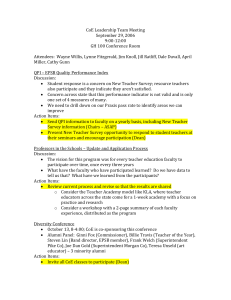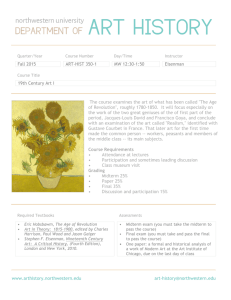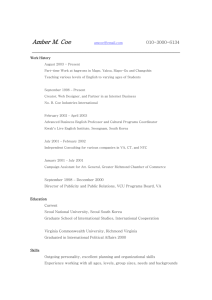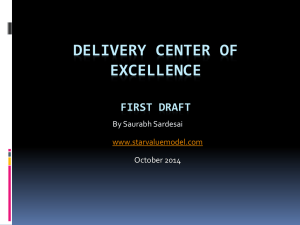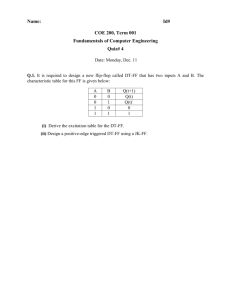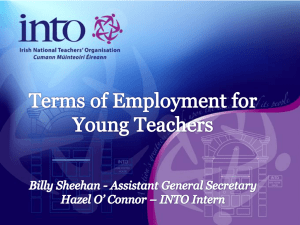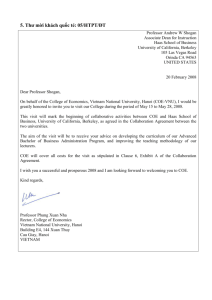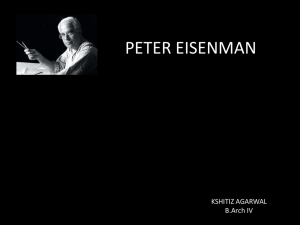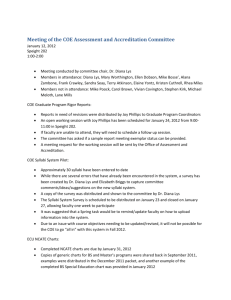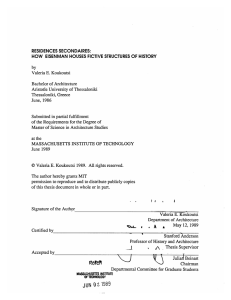Minutes COE 08-08-11
advertisement
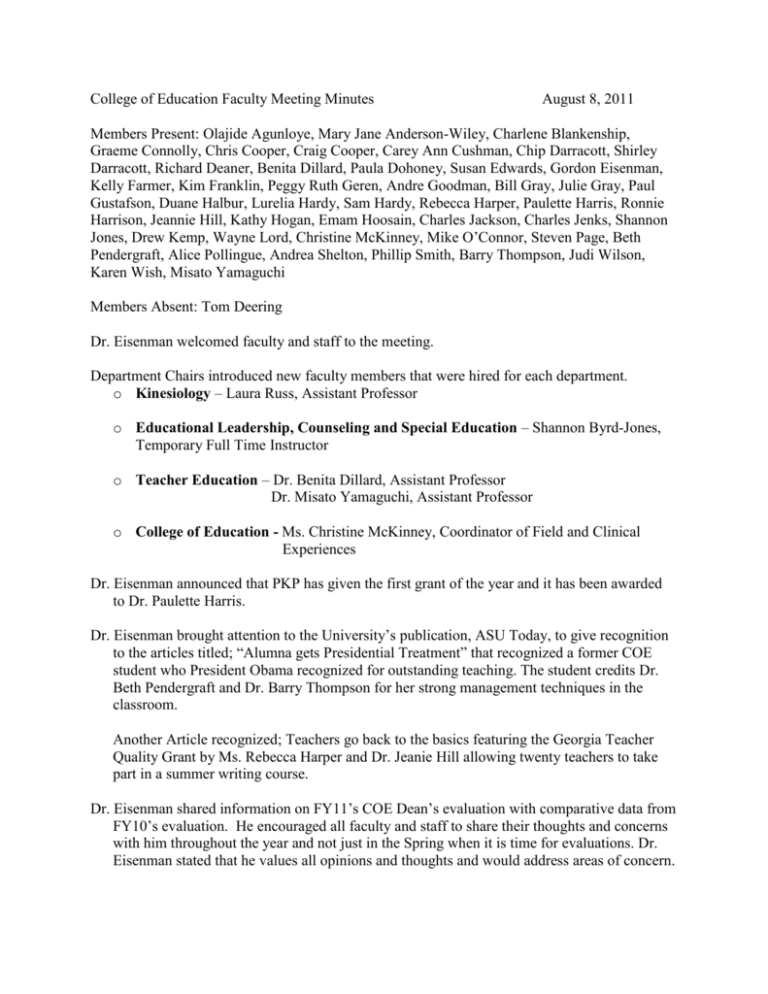
College of Education Faculty Meeting Minutes August 8, 2011 Members Present: Olajide Agunloye, Mary Jane Anderson-Wiley, Charlene Blankenship, Graeme Connolly, Chris Cooper, Craig Cooper, Carey Ann Cushman, Chip Darracott, Shirley Darracott, Richard Deaner, Benita Dillard, Paula Dohoney, Susan Edwards, Gordon Eisenman, Kelly Farmer, Kim Franklin, Peggy Ruth Geren, Andre Goodman, Bill Gray, Julie Gray, Paul Gustafson, Duane Halbur, Lurelia Hardy, Sam Hardy, Rebecca Harper, Paulette Harris, Ronnie Harrison, Jeannie Hill, Kathy Hogan, Emam Hoosain, Charles Jackson, Charles Jenks, Shannon Jones, Drew Kemp, Wayne Lord, Christine McKinney, Mike O’Connor, Steven Page, Beth Pendergraft, Alice Pollingue, Andrea Shelton, Phillip Smith, Barry Thompson, Judi Wilson, Karen Wish, Misato Yamaguchi Members Absent: Tom Deering Dr. Eisenman welcomed faculty and staff to the meeting. Department Chairs introduced new faculty members that were hired for each department. o Kinesiology – Laura Russ, Assistant Professor o Educational Leadership, Counseling and Special Education – Shannon Byrd-Jones, Temporary Full Time Instructor o Teacher Education – Dr. Benita Dillard, Assistant Professor Dr. Misato Yamaguchi, Assistant Professor o College of Education - Ms. Christine McKinney, Coordinator of Field and Clinical Experiences Dr. Eisenman announced that PKP has given the first grant of the year and it has been awarded to Dr. Paulette Harris. Dr. Eisenman brought attention to the University’s publication, ASU Today, to give recognition to the articles titled; “Alumna gets Presidential Treatment” that recognized a former COE student who President Obama recognized for outstanding teaching. The student credits Dr. Beth Pendergraft and Dr. Barry Thompson for her strong management techniques in the classroom. Another Article recognized; Teachers go back to the basics featuring the Georgia Teacher Quality Grant by Ms. Rebecca Harper and Dr. Jeanie Hill allowing twenty teachers to take part in a summer writing course. Dr. Eisenman shared information on FY11’s COE Dean’s evaluation with comparative data from FY10’s evaluation. He encouraged all faculty and staff to share their thoughts and concerns with him throughout the year and not just in the Spring when it is time for evaluations. Dr. Eisenman stated that he values all opinions and thoughts and would address areas of concern. Dr. Eisenman gave an update on the new building plans for the West Campus site. The new building will house the Nursing department and the Hull College of Business. Previous plans were to include the COE. As plans stand, the proposed changes for growth for the COE are to take place in University Hall. Accommodations will include making all classrooms on the third floor for the COE, the Nursing department suite on the second floor of University Hall, and the current Honors Program office on the third floor of University Hall to become a designated conference room for the COE. The proposed changes in University Hall for the COE will allow for a fourth department to be created in the foreseeable future. Dr. Eisenman informed that ASU will be moving forward with Academic Partners (AP). AP will be coming to campus to assess the needs of the University. Questionnaires have been completed and sent back to AP to prepare to address questions during the visit. Dr. Eisenman announced that the COE is now a member of Quality Matters (QM). The COE currently has full access to QM for all needs. There will be a transition process to get information to QM. There will be a drop dead date set and given at a later time. Information to be sent to them will be for all online courses for evaluation and verification of quality. Dr. Dohoney announced that the NCATE onsite visit for will begin on February 4, 2012. In preparation for this visit the COE has created an Exhibit site on the COE webpage based on NCATE standards. All work that has been submitted to the Dean’s office for this purpose has been added to the website. Though the IR was submitted on April 1, 2011, it has not been reviewed by Examiners yet. The COE has been informed that the offsite visit for NCATE will take place sometime in September 2011. There will be ten reviewers for the offsite and on-site visit, five from NCATE and five from the PSC. These individuals will review information that previously may have been flagged for improvement in the last IR that was submitted such as Unit Assessments under Standard Two. The reviewers will be looking for how the unit uses the data collected. This information is contained within the Evaluation of Data Reporters. In 2004, the COE was not systematically using this approach and now we can demonstrate that we are. Based on the rubric that NCATE will be using, we hope to show the improvements that have been made in Standard Two. Improvements include initial preparation programs review of previous semester evaluations and data that shows areas that need improvement. Other areas of review will include semester reports for both MEd. and EdS programs reports, and annual reports submitted by Counselor Education and Educational Leadership. She stated that just listing data and doing nothing with that data to improve candidates and programs is worthless. Dr. Eisenman stated that all areas of weakness effect everyone in the COE and not just the individual. Any report that is submitted without data will be returned to the individual for completion. All reports must contain data that show areas for improvement with specific recommendations on how to improve. Dr. Dohoney stated that the University Supervisor’s training that was held in the Spring 2011 addressed an issue in one of the Evaluation of Data reports that discussed concerns for interrater reliability. Dr. Lord stated that data reports for previous semesters should be revisited twice a year and should be used in a formative process. This will enable the committee of programs to review what was seen as needing improvement and how it may have been improved upon. This process has been in place for approximately two years and has helped in the process of understanding for improvement in areas by defining the points of interest. An example of this would be the preparation to teach online courses with the key issues based on the candidates’ part in the process. Dr. Hoosain asked if this should also be based on the basic principles of teaching and to be used for recommendations for improvement for candidates and programs. Dr. Lord and Dr. Dohoney both agreed that is how it should be. Mr. Harrison asked if suggestion or recommendations for the reports on improvements should be submitted and Dr. Dohoney said yes. Faculty members were asked to review the information that is currently on the NCATE Exhibit site and to submit suggestion for improvement.

